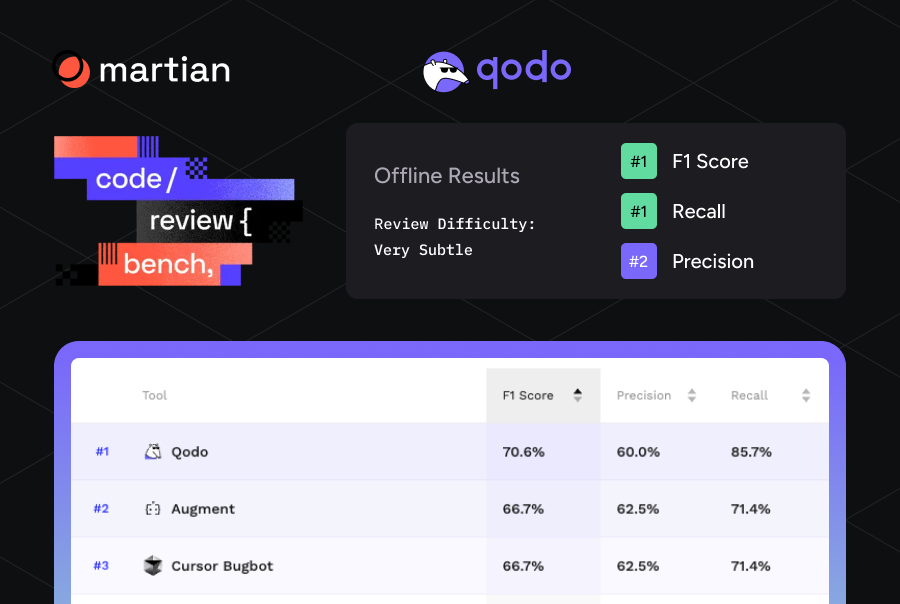Top 3 Windsurf Alternatives For Developers in 2025
TL;DR
- Windsurf is commonly used for agentic multi-file code editing, in-line suggestions, and AI-assisted refactoring that respects project structure and developer intent.
- The credit-based usage and pricing model may need to be reviewed to ensure it works well for large-scale enterprises.
- Teams working with large, multi-repo architectures may struggle with consistency, hallucinations and support
- There are three top alternatives to Windsurf: Qodo, GitHub Copilot, and Cursor; each catering to different segments.
- Among these, Qodo is the best choice for enterprises, offering powerful AI features, deep integrations, and scalable performance for complex projects.
In the last few years, there has been a significant increase in AI coding tools that help engineers speed up their development cycles by helping them code faster and deliver quality software on time. Windsurf is one such AI-powered IDE tool that is popular among senior developers for its AI-assisted code suggestions, auto-refactoring, and integrated debugging capabilities. It has built a loyal following by offering a sleek, AI-augmented coding environment that fits modern software delivery pipelines.
As a Senior Engineer, I’ve used Windsurf on several projects and found it helpful. It fits well into contemporary delivery pipelines where automation, speed, and code accuracy are essential. Its sleek interface and AI capabilities aim to reduce manual effort across coding, testing, and debugging tasks. For teams dealing with multi-file logic or repetitive patterns, Windsurf can offer noticeable productivity gains. Its benefits include intelligent code completion, streamlined refactoring, and integrated support for debugging and test generation.
However, some developers have observed that repeated prompt usage can lead to increased credit consumption. Others have noted that the tool may not always retain context or user preferences between sessions. This is why it becomes important to explore alternatives.
Choosing the right alternative ensures teams are getting better value for their investment and accessing tools that deliver consistent, context-aware AI support, deeper integrations, and scalable performance. So, in this blog, I will walk you through the top three Windsurf alternatives developers should seriously consider in 2025.
Why Explore Alternatives to Windsurf?
Windsurf is a user-friendly AI coding assistant, known for features like Cascade for contextual code generation. It’s a solid tool for many developers, but certain factors may lead teams, especially at the enterprise level, to explore alternatives. In practical use, WindSurf can be a useful tool across various projects. However, some developers have shared observations on community forums, noting that repeated prompts may lead to increased credit usage. Others have mentioned that the tool may not consistently retain user preferences or context across sessions.  Now that Anthropic has begun limiting Windsurf’s access to its models, the company cited limited computing resources and a need to focus on ‘sustainable partnerships’ that support its long-term goals. Some developers have noted that Windsurf’s pricing can become a concern, especially for teams managing multiple projects. In enterprise settings, users typically look for predictable performance, efficient credit usage, and platform stability. For large monorepos or modular systems, inconsistent output or occasional lags may impact development speed and code quality.
Now that Anthropic has begun limiting Windsurf’s access to its models, the company cited limited computing resources and a need to focus on ‘sustainable partnerships’ that support its long-term goals. Some developers have noted that Windsurf’s pricing can become a concern, especially for teams managing multiple projects. In enterprise settings, users typically look for predictable performance, efficient credit usage, and platform stability. For large monorepos or modular systems, inconsistent output or occasional lags may impact development speed and code quality.
Credit usage can become costly at scale
Windsurf uses a credit-based model, which some users have found depletes quickly, even on higher-tier plans. For teams running high-frequency prompts or complex workflows, this can lead to unexpected top-ups and cost variability.  We can see in the reddit post above how users on Reddit are discussing this pricing problem and looking for alternatives. Hence, developers can look for tools like Qodo and Cursor that offer different pricing approaches that may better support heavy or sustained use.
We can see in the reddit post above how users on Reddit are discussing this pricing problem and looking for alternatives. Hence, developers can look for tools like Qodo and Cursor that offer different pricing approaches that may better support heavy or sustained use.
Performance may lag in large or complex projects
In my experience, when I have worked in larger projects, especially those using frameworks like TypeScript with nested components, Windsurf’s real-time suggestions may occasionally lag. While not a blocker, these delays can disrupt fast development cycles.
Models hallucinate more for complex projects
There are cases where the AI makes broad changes, such as refactoring related files, without full context. While helpful in some scenarios, this can introduce bugs in more complex codebases. Bottom Line: Windsurf offers real value, particularly for individual developers or small teams. But for enterprise use, priorities like predictable pricing, robust integrations, and reliable performance at scale may lead teams to explore alternatives better suited to their environment.
Leadership Transition and Strategic Shifts
In a major development within the AI coding tools landscape, Windsurf has experienced a significant leadership shake-up following Google’s acquisition of its key talent. CEO Varun Mohan, co-founder Douglas Chen, and a team of top engineers have been absorbed into Google’s DeepMind division as part of a strategic acquisition (also known as an acquihire).While Windsurf continues as an independent entity, the departure of its core leadership and technical talent raises questions about the future direction of the company and the pace of innovation. For enterprise customers, these changes can lead to concerns over long-term stability and continuity of service.
Top 3 Windsurf Alternatives To Choose From
Choosing the right AI coding tool can impact productivity and cost-efficiency. Below is a clear comparison of the top three Windsurf alternatives, each offering distinct strengths, flexible pricing models, and developer-focused features designed to meet specific project needs.
| Feature | Windsurf | Qodo (Top Pick) | GitHub Copilot | Cursor |
| Enterprise Pricing (per user/month) | $60 | Free + $30/user | $39 | $40 |
| Functionality | – Code completion – Natural language chat – Agentic mode – Governed secure MCP servers – Code reviews within IDE – Best practices including compliance checks | – Code generation – Natural language chat – Agentic mode – Context-aware reviews – Critical compliance enforcement – Governed MCP server catalog – Terminal based interface (Qodo Command / CLI) | – Code generation – Natural language chat – Agentic mode | – Code generation – Natural language chat – Agentic mode |
| Supported IDEs | VS Code, JetBrains | VS Code JetBrains Visual Studio Terminal / CLI | VS Code, JetBrains | Cursor Custom IDE |
| Security & Compliance | – SOC 2 – SSL Encryption – Scoped context (per org, session, agent) – Zero Data Retention | – SOC 2 – TLS/SSL Encryption – Scoped context (per deployment type) | – SOC 2 – TLS Encryption – No formal scoping | – SOC 2 – TLS Encryption – Scoped to project/session – Zero Data Retention |
| Agentic Workflows | – Secure MCP tooling | – Secure, governed MCP server catalogue | – Context-aware generation | – Precise, context-aware code reviews |
| Best Practices in Code Reviews | Not specified | – Enforces best practices across tests, reviews, suggestions – Org-level best practices- Microservices and mono-repo support (coming soon) | Not specified | Limited support |
| Model Support | – GPT-4o – Claude 3.7 – Claude 4x – DeepSeek-R1 – Gemini 2.5 Pro – On-prem airgapped models available | – GPT-4o – Claude 3.7 – Claude 4x – DeepSeek-R1 – Gemini 2.5 Pro – Cascade Base | – GPT-4o – Claude 3.7 – Claude 4x – DeepSeek-R1 – Gemini 2.5 Pro | – GPT-4o – Claude 3.7 – Claude 4x – DeepSeek-R1 – Gemini 2.5 Pro |
| Deployment Options | Cloud-based, On-prem | Cloud-based, On-prem, Airgapped | Cloud-based | Cloud-based |
To make your decision even clearer, below is a visual comparison across critical dimensions such as code generation, code review, debugging assistance, context awareness, integration flexibility, and multi-language support. This radar chart provides a side-by-side look at how Qodo, GitHub Copilot, and Cursor stack up, helping you pinpoint which tool aligns best with your team’s scale, workflow, and technical needs. 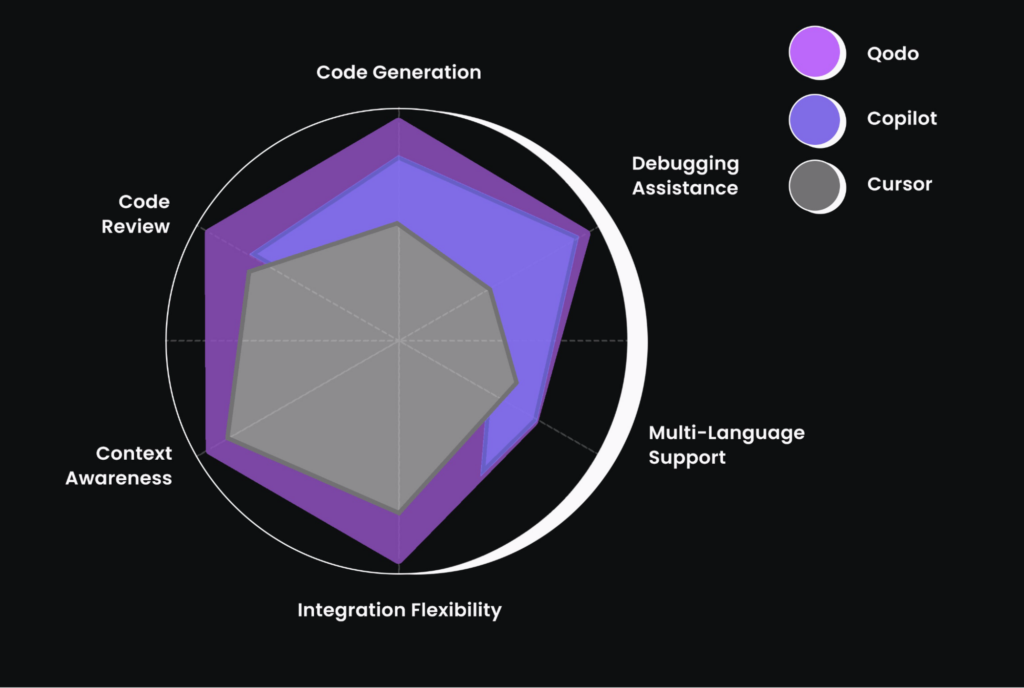
Qodo
 Qodo is the best Windsurf alternative for the enterprise. It is an enterprise-grade AI with Qodo Gen as a plugin for IDE and Qodo Merge as a code review agent that integrates with your Git platform. Unlike general-purpose tools, Qodo stands as the best AI code generator because of its excellent AI-powered code generation, review, and debugging across multi-repo, multi-language systems with deep context awareness. Its RAG (Retrieval-Augmented Generation) feature pulls relevant knowledge from both the codebase and documentation, making it highly effective for tackling complex development tasks such as integrating new features across multi-repo systems, debugging intricate and ensuring compliance with project documentation, all at speed and scale.
Qodo is the best Windsurf alternative for the enterprise. It is an enterprise-grade AI with Qodo Gen as a plugin for IDE and Qodo Merge as a code review agent that integrates with your Git platform. Unlike general-purpose tools, Qodo stands as the best AI code generator because of its excellent AI-powered code generation, review, and debugging across multi-repo, multi-language systems with deep context awareness. Its RAG (Retrieval-Augmented Generation) feature pulls relevant knowledge from both the codebase and documentation, making it highly effective for tackling complex development tasks such as integrating new features across multi-repo systems, debugging intricate and ensuring compliance with project documentation, all at speed and scale.
Best For
Qodo is ideal for large enterprises, senior developers, and engineering teams operating at enterprise scale, especially those managing large, multi-repository codebases and complex CI/CD workflows. It supports deployments in secure, controlled environments through its on-premise and single-tenant enterprise plans, making it suitable for teams with strict compliance, security and risk-management thresholds. It is also developer-friendly and available to start for free. Features
- Contextual AI code generation and large-scale refactoring
- RAG-powered code review and unified knowledge search across codebases
- Advanced debugging with AI-driven suggestions and root cause analysis
- Full support for multi-repo, multi-language projects (Java, Python, Go, TypeScript, and more)
- Seamless integration with IDEs, GitHub, GitLab, Bitbucket, and CI/CD pipelines
- Qodo Command for building, running, and managing AI agents from the command line (now in Alpha)
- Security & Compliance
First-Hand Example
Qodo’s RAG feature delivered context-aware suggestions that cut review times significantly. In one of my recent React projects, I used Qodo to identify and resolve the potential bugs in the App.tsx file that could have led to technical debt. Here’s the response: 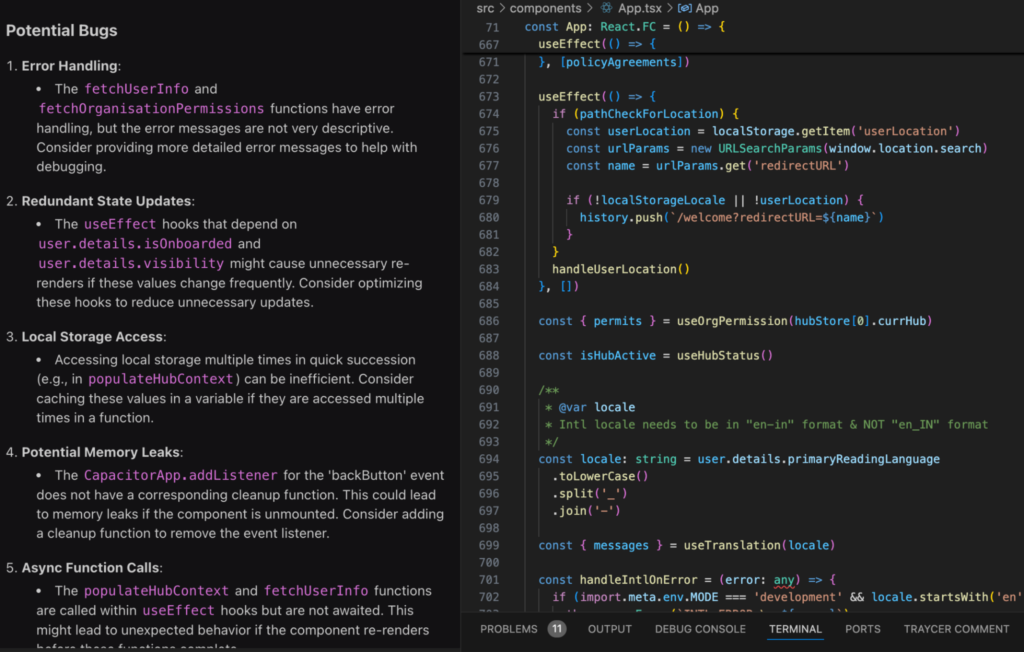 It flagged vague error messages in fetchUserInfo and fetchOrganisationPermissions, reminding me that they would complicate debugging later. Qodo also highlighted redundant state updates in useEffect, which could have caused unnecessary re-renders and slowed the interface. However, the two issues that literally helped me to think about how it could affect my product were: Local Storage Access: Qodo pointed out that local storage was being accessed repeatedly within a short span (e.g., in populateHubContext and pathCheckForLocation). This could have caused performance issues, especially if those reads happen during component mounting. The review suggested caching those values locally to avoid repeated lookups. Missing Cleanup on Event Listeners: One of the more serious findings was in the use of CapacitorApp.addListener for the backButton event. Qodo identified that there was no corresponding cleanup logic, which could easily lead to memory leaks if the component unmounts. Adding a cleanup function with proper teardown fixed the issue before it reached production. Compared to other tools, Qodo Merge integrated more smoothly into our GitHub Actions pipeline. Its PR bot automatically delivers AI-powered review suggestions on every pull request, eliminating the need for manual triggers and streamlining the peer review process..
It flagged vague error messages in fetchUserInfo and fetchOrganisationPermissions, reminding me that they would complicate debugging later. Qodo also highlighted redundant state updates in useEffect, which could have caused unnecessary re-renders and slowed the interface. However, the two issues that literally helped me to think about how it could affect my product were: Local Storage Access: Qodo pointed out that local storage was being accessed repeatedly within a short span (e.g., in populateHubContext and pathCheckForLocation). This could have caused performance issues, especially if those reads happen during component mounting. The review suggested caching those values locally to avoid repeated lookups. Missing Cleanup on Event Listeners: One of the more serious findings was in the use of CapacitorApp.addListener for the backButton event. Qodo identified that there was no corresponding cleanup logic, which could easily lead to memory leaks if the component unmounts. Adding a cleanup function with proper teardown fixed the issue before it reached production. Compared to other tools, Qodo Merge integrated more smoothly into our GitHub Actions pipeline. Its PR bot automatically delivers AI-powered review suggestions on every pull request, eliminating the need for manual triggers and streamlining the peer review process..
Pros
- Exceptional context handling in complex codebases
- High-quality, AI-generated code suggestions tailored to enterprise standards by following coding practices specific to your organization
- Scalable performance even under heavy, multi-repo workloads
Cons
- Advanced features require configuration effort during initial setup.
Pricing
The Developer plan is free, offering 250 monthly messages with tools like Qodo Merge and Qodo Gen, providing code reviews, issue detection, documentation, and community support. The Teams plan, at $30 per user per month, includes everything in Developer plus 5,000 messages, bug surfacing, automated PR descriptions, and private support with optional SSO. For enterprise plans, Speak to Qodo to access the full intelligent coding platform with advanced features and enterprise-level support.
GitHub Copilot
 GitHub Copilot is an AI code assistant developed by GitHub in collaboration with OpenAI. It uses advanced machine learning generative models such as OpenAI’s Codex to generate code suggestions, complete functions, and even write entire blocks of code based on natural language comments or partial inputs. It is designed to help developers write code faster, reduce repetitive tasks, and explore new approaches while coding.
GitHub Copilot is an AI code assistant developed by GitHub in collaboration with OpenAI. It uses advanced machine learning generative models such as OpenAI’s Codex to generate code suggestions, complete functions, and even write entire blocks of code based on natural language comments or partial inputs. It is designed to help developers write code faster, reduce repetitive tasks, and explore new approaches while coding.
Best For
GitHub Copilot is a suitable choice for developers who prefer AI assistance within Visual Studio Code and similar IDEs, offering inline code suggestions and quick completions during development. It is especially useful for those who want AI code completions, boilerplate generation, and assistance across multiple programming languages.
Features
- Generates context-aware code suggestions and completions
- Supports languages like Java, Python, etc, and other frameworks
- Generates code based on natural language comments
- Helps with repetitive code patterns and boilerplate generation
- Continuously learns and improves from the coding context
- Integrates with popular IDEs like Visual Studio Code, Neovim, and JetBrains IDEs
First-Hand Example
While developing a machine learning pipeline in Python, I needed to improve a custom data preprocessing function that normalized features, handled missing values, and encoded categorical variables, all in one reusable function. Here’s a snapshot of what Copilot generated: 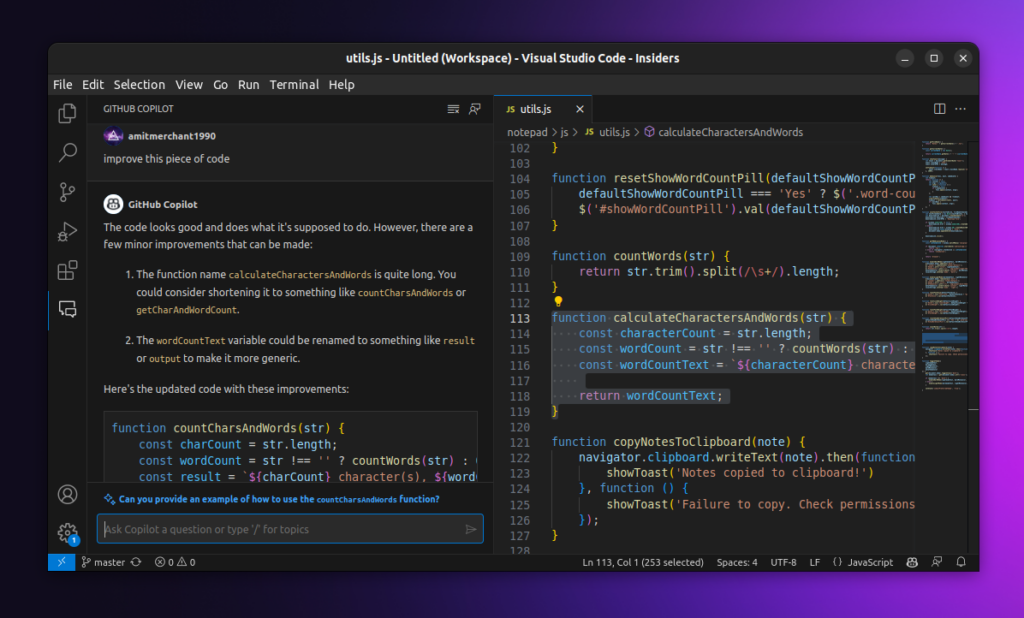 GitHub Copilot then generated a complete, well-structured function that included imports, handled edge cases, and optimized for pandas DataFrames. The suggested code followed best practices and included optional parameters for flexibility, such as choosing the scaling method or encoding strategy.
GitHub Copilot then generated a complete, well-structured function that included imports, handled edge cases, and optimized for pandas DataFrames. The suggested code followed best practices and included optional parameters for flexibility, such as choosing the scaling method or encoding strategy.
Pros
- Speeds up coding by offering relevant suggestions
- Supports a wide range of programming languages
- Easy to integrate with existing developer environments like Visual Studio Code, JetBrains IDEs, and even GitHub’s web editor
- Helps reduce syntax errors and improve code quality
- Constantly updated and improved by GitHub and OpenAI
Cons
- Sometimes generates inaccurate or suboptimal code requiring manual review
- Can produce code that doesn’t fully align with project-specific standards or best practices
- May raise concerns about code licensing and originality in certain cases
Pricing
GitHub Copilot offers a free plan for individuals and organizations with basic AI coding features at no cost. The Team plan costs $4 per user per month with advanced collaboration tools. The Enterprise plan starts at $21 per user per month, including all Team features plus enhanced security, compliance, and flexible deployment for larger organizations.
Cursor
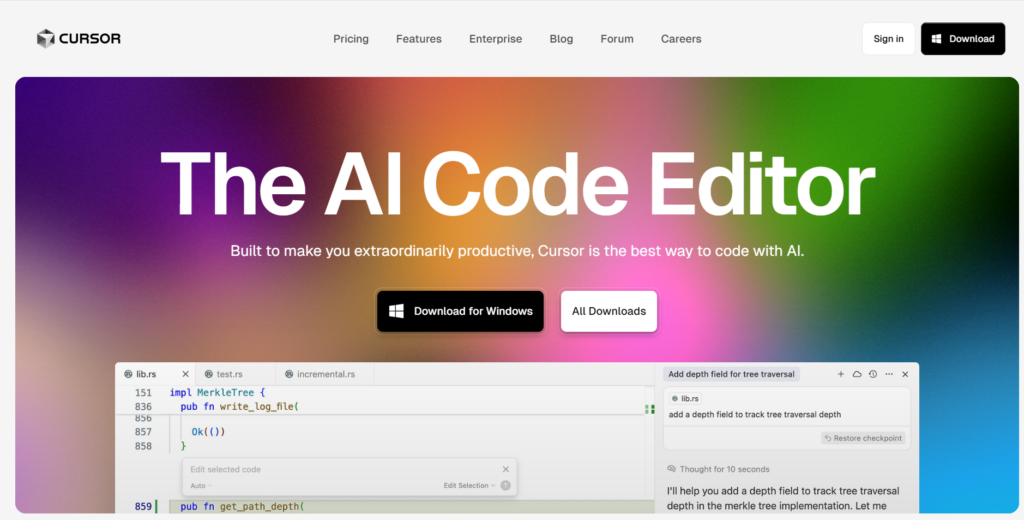 Cursor is an AI-driven code editor that is built for developers who want lightweight, AI assistance embedded directly into their editing workflow. Unlike heavier IDEs, Cursor focuses on real-time code suggestions, refactoring, and a chat-based AI assistant packed into a minimal setup. With GitHub Copilot integration and near-instant AI completions, it is designed to maximize individual developer productivity without requiring enterprise-scale configurations.
Cursor is an AI-driven code editor that is built for developers who want lightweight, AI assistance embedded directly into their editing workflow. Unlike heavier IDEs, Cursor focuses on real-time code suggestions, refactoring, and a chat-based AI assistant packed into a minimal setup. With GitHub Copilot integration and near-instant AI completions, it is designed to maximize individual developer productivity without requiring enterprise-scale configurations.
Best For
Cursor is best suited for individual developers and small teams looking for an AI-powered editor with an integrated coding assistant and built-in CLI support inside the AI chat. It is ideal for those looking to improve daily coding efficiency through fast code completions, smart refactoring, and interactive AI help, all without switching between tools.
Features
- Real-time in-editor AI code completions and refactoring
- Integrated chat-based AI assistant for code explanations and suggestions
- Seamless GitHub Copilot integration for enhanced completions
- Lightweight installation with minimal configuration and fast startup times
First-Hand Example
I used Cursor on a side project involving Python and Typer, where I wanted fast prototyping without the overhead of a full IDE setup. The in-editor AI completions were quicker than heavier tools, and the chat assistant helped debug small issues without switching context. 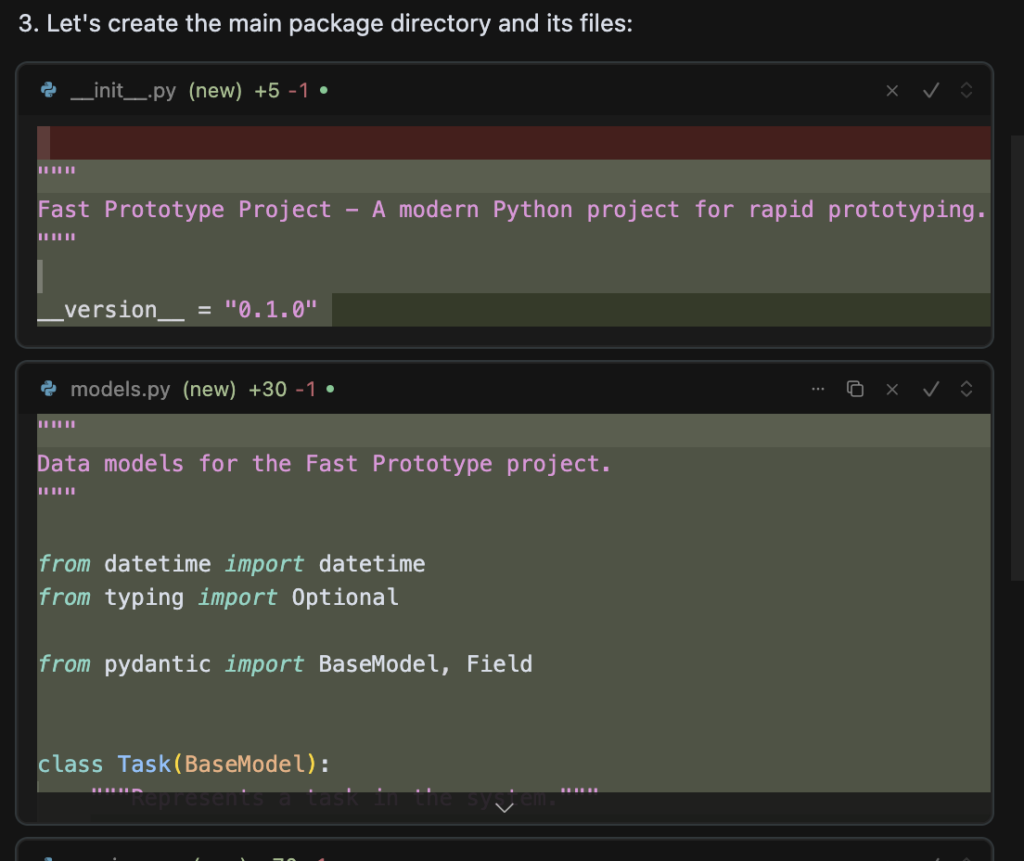 For local development, Cursor’s minimal footprint meant I could install and get running in minutes, which made it perfect for rapid experimentation. However, I found its lightweight nature limited for larger projects with deep codebase integrations compared to enterprise AI IDEs.
For local development, Cursor’s minimal footprint meant I could install and get running in minutes, which made it perfect for rapid experimentation. However, I found its lightweight nature limited for larger projects with deep codebase integrations compared to enterprise AI IDEs.
Pros
- Minimal setup, suitable for quick installs and personal use
- Integrated AI chat assistant helps with explanations of the codebase and bug fixes
- GitHub Copilot integration extends capabilities without extra tools
Cons
- For broader suggestions across files or modules, users often need to open or specify relevant files using commands like @file or @folder.
- Features like role-based access control (RBAC), audit logs, or private model hosting are not currently available, which may be important for regulated teams.
Pricing
Cursor offers flexible pricing with monthly and yearly plans. The free Hobby plan includes 200 completions and 50 requests per month, making it suitable for casual users. For more advanced features, the Pro plan at $20 per month provides unlimited completions, 500 requests, and additional features like Max mode. Also, the Business plan, priced at $40 per user per month, includes all Pro features and extra benefits designed for team collaboration and larger workflows.
Why Qodo is Better for Enterprises?
Qodo is designed for enterprise-scale engineering workflows, offering AI-powered code generation, code review, and documentation tools. It supports languages like Python, Java, TypeScript, Go, and more, and integrates with platforms such as GitHub, GitLab, Bitbucket, and CI workflows. With Retrieval-Augmented Generation (RAG), Qodo surfaces code suggestions and documentation based on actual usage patterns, architectural context, and project history. Its tools like /review, /implement, and /ask bring relevant context directly into the pull request process, improving accuracy and reducing manual rework. In my experience, this has made the difference between spending hours chasing down related issues and resolving them upfront with AI-driven suggestions that account for the entire system. So, if you’re looking for Windsurf alternatives, you can go for Qodo for both pricing factors and functionalities.
Expert Tip: How I Use Qodo in Real Code Reviews
Qodo supports structured, context-aware code reviews by tying into Git-native workflows. In my review process, I use it to identify gaps in story linkage, detect code inconsistencies, and surface patterns that might affect performance.
- Qodo checks for missing story IDs or product references by analyzing commit messages and PR metadata. This ensures the review includes necessary business context.
- It flags naming or structure mismatches by referencing previously accepted patterns in the codebase, helping maintain consistency across modules.
- When reviewing backend changes, I rely on Qodo to call out potential latency risks or cache invalidation scenarios based on its understanding of recent changes and historical usage patterns.
This automation helps me focus reviews on broader architectural alignment instead of manually tracing impact across services.
Conclusion
Windsurf is an AI coding tool designed to easily handle complex, large-scale projects, though its performance may vary depending on usage patterns and project scale. However, choosing the right AI development tool in 2025 is no longer just about adding speed; it’s about selecting the platform that aligns with your team’s size, complexity, and long-term goals. While tools like Cursor offer fast, lightweight AI assistance, GitHub Copilot provides solid rule-based automation for small to mid-sized teams. For enterprises, Qodo supports internal coding patterns by giving AI suggestions in actual code, docs, and changelogs, helping teams maintain consistency and align with their architecture. Its RAG-powered code review, debugging, and integrations make it the best choice for organizations looking to scale productivity, improve code quality, and manage complex development workflows effectively. For senior developers and engineering leads, the decision comes down to matching the tool’s strengths to your real-world challenges. In my experience, teams at scale consistently benefit from Qodo’s deeper integrations, richer AI context, and enterprise-grade support, making it the top Windsurf alternative worth serious consideration.
FAQs
What is the best Windsurf alternative for enterprise?
If you are looking for a reliable alternative to Windsurf for enterprise, you should consider Qodo, which is purpose-built for large teams, offers seamless integration across tools, and supports enterprise-level scalability and compliance.
What is Windsurf best for, and what is it not?
Windsurf is best suited for smaller development teams that focus on rapid prototyping and experimentation. However, it may not be ideal for enterprises that require advanced governance, robust compliance frameworks, and large-scale coordination across multiple teams and repositories.
Can I use Windsurf for enterprise code?
Yes, you can use Windsurf for enterprise code, but it’s worth considering whether it meets all your needs. For organizations with complex workflows, strict compliance, and multi-repository management, it might be more practical to explore a stronger, enterprise-focused solution.
Is Windsurf secure and SOC2 compliant?
Windsurf does offer basic security features, but you should carefully verify its SOC2 compliance if your enterprise has stringent security requirements. For companies prioritizing top-tier compliance and full enterprise-grade security, a platform like Qodo Merge may provide a more suitable and assured option.




